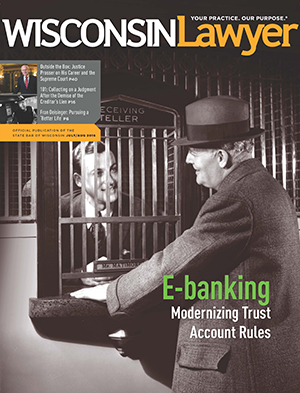
July 29, 2016 – The July/August Wisconsin Lawyer, hitting mailboxes soon, is now online. This issue is packed with important information, such as changes to lawyer trust account rules, and profiles on your new State Bar of Wisconsin president, Fran Deisinger, as well as retiring Wisconsin Supreme Court Justice David T. Prosser Jr.
Trust Account Rules: E-banking
In “E-banking: Modernizing Trust Account Rules,” State Bar of Wisconsin Ethics Counsel Tim Pierce explains amendments to the Rules of Professional Conduct for Attorneys that bring the rules governing lawyers’ handling of trust property more in line with modern banking practices.
Perhaps the most significant change is that lawyers can, under certain circumstances, make electronic transfers into and out of standard IOLTA accounts. While Wisconsin’s trust account rule, SCR 20.1.15, is still complex, the changes do much to modernize the regulation of lawyer trust accounts. The new rule took effect on July 1, 2016.
Justice Prosser Reflects On His Career
After 18 years on the Wisconsin Supreme Court, Justice David Prosser is retiring on July 31, 2016. In “Outside the Box: Justice Prosser on His Career and the Supreme Court,” by legal writer Joe Forward, Justice Prosser talks candidly about his career, opinion writing, judicial independence, recusal, and collegiality. He explains his somewhat unusual path to the supreme court, the legacy he hopes to leave, and his decision to retire with five years remaining on his 10-year term.
Improving Educational Quality through Standards-based Accountability
Most federal and state lawmakers agree that U.S. schools need to better serve all students, especially ones from disadvantaged backgrounds, but controversy continues over how to meet that goal. In 2015, Congress passed the Every Student Succeeds Act (ESSA) to improve educational quality for all students.
In “School Accountability After ‘No Child Left Behind',” Jessica Ozalp and Rachel Snyder look at ESSA’s key provisions and what the federal Department of Education and Wisconsin’s elected officials are doing to reform K-12 public schools.
Protecting Confidentiality with Wisconsin’s Mediation Privilege
The primary goal of mediation is to reach a settlement; nearly as important is conveying information during mediation in such a way that Wisconsin’s mediation privilege protects the communications. In “Sounding the Depths of Wisconsin’s Mediation Privilege,” Dan La Fave discusses the privilege and its three general exceptions.
101: Collecting on a Judgment
In “How to Collect on a Judgment After the Demise of the Creditor’s Lien,” Megan Stelljes shows lawyers other ways to use the supplemental examination so as to help creditor clients maximize their ability to collect from debtors, now that the supreme court has done away with the creditor’s lien.
Other Columns: Scrubbing Metadata, Imputing Lawyer’s Conflict to Firm Members, a Healing Profession
Profile: In “Fran Deisinger: Pursuing a ‘Better Life,’” the State Bar’s newest president looks forward to a year of bringing together members with diverse views to harness their collective action to improve the profession and the legal system.
Technology: In “So, You Want To … Scrub Metadata from Word Files,” State Bar practice management advisor Tison Rhine gives you the steps to remove potentially embarrassing, or even damaging, metadata from your Word files.
Ethics: In “Lawyer’s Conflicts Might Not Be Imputed to All Firm Members,” Dean Dietrich says in certain circumstances a firm can represent an entity despite a firm member’s personal conflict of interest with the client.
Final Thought: In “Counselor, Heal Thyself,” Bartlett Durand says the law is one of the healing professions. As such, lawyers must remove emotion and personal animus to find a resolution that works, because it is the resolution of conflict that diminishes open violence and creates a lawful society. He urges simple professionalism.
On Balance: Paula Davis-Laack, in “5 Ways Lawyers Can Profit from Positive Leadership,” says these tips will help you become a better lawyer and leader.
Managing Risk: Tom Watson, in “Bankruptcy Cases: Proceed with Caution,” warns lawyers unfamiliar with recent bankruptcy law developments risk committing errors that could harm their clients and endanger their own disciplinary records.
Your State Bar: Executive Director George Brown, in “Go Rural, New Lawyer,” invites new lawyers to hop on the Greater Wisconsin Initiative Bus Tour, Oct. 7-8, to experience the opportunities of rural practice.
Learn what your colleagues are doing in the “Members Only” column, get legal tidbits in the “Briefly” column, and check out the full July/August Wisconsin Lawyer for the rest.
